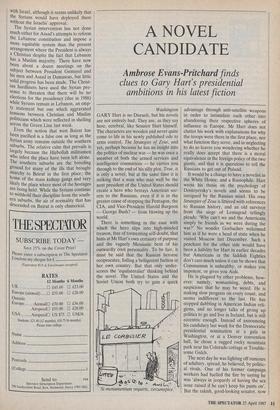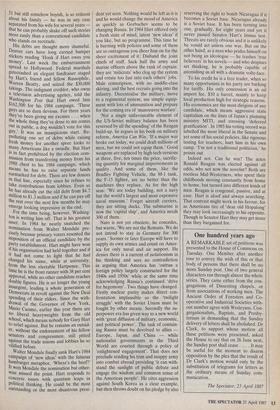A NOVEL CANDIDATE
Ambrose Evans-Pritchard finds clues to Gary Hart's presidential ambitions in his latest fiction
Washington GARY Hart is no Disraeli, but his novels are not entirely bad. They are, as they say here, cerebral, like Senator Hart himself. The characters are wooden and never quite come to life in his newly published ode to arms control, The Strategies of Zeus, and yet, perhaps because he has an insight into the politics of nuclear war — he was once a member of both the armed services and intelligence committees — he carries you through to the end of his silly plot. True, it is only a novel, but at the same time it is striking that a man who may well be the next president of the United States should create a hero who betrays American sec- rets to the Russians, even if it is in the greater cause of stopping the Pentagon, the CIA, and Vice-President Harold Burgoon — George Bush? — from blowing up the world.
There is something in the ease with which the hero slips into high-minded treason, free of tormenting self-doubt, that hints at Mr Hart's own certainty of purpose and the vaguely Messianic bent of his outwardly cool personality. To be fair, it must be said that the Russian heroine reciprocates, foiling a belligerent faction in her own country. But that only under- scores the `equilateralise thinking behind the novel. The United States and the Soviet Union both try to gain a quick 'Si monumentum requiris, circumspice. advantage through anti-satellite weapons in order to intimidate each other into abandoning their respective spheres of influence in Europe. Mr Hart does not clutter his work with explanations for why the troops were there in the first place, nor what function they serve, and in neglecting to do so leaves you wondering whether he really does accept that there is a moral equivalence in the foreign policy of the two giants, and that it is querulous to tell the Russians to get out of Poland.
It would be a change to have a novelist in the White House, and a Russophile. Hart wrote his thesis on the psychology of Dostoyevsky's novels and seems to be intrigued by the Russian mind. His own Strategies of Zeus is littered with references to Russian history, and an old survivor from the siege of Leningrad tellingly pleads: 'Why can't we and the Americans simply be friends as we were during the war?' No wonder Gorbachev welcomed him as if he were a head of state when he visited Moscow last December. Such a penchant for the other side would have been a liability for Hart in earlier decades but Americans in the faddish Eighties don't care much unless it can be shown that Communism is unhealthy, or makes you impotent, or gives you Aids.
He is plagued by other problems, how- ever: namely, womanising, debts, and suspicions that he may be weird. He is making slow progress on every count, and seems indifferent to the last. He has stopped dabbling in American Indian reli- gions, and no longer talks of giving up politics to go and live in Ireland, but is still eccentric enough. Instead of announcing his candidacy last week for the Democratic presidential nomination at a gala in Washington, or at a Denver convention hall, he chose a rugged rocky mountain park near his Colorado cottage at Trouble- some Gulch.
The next day he was fighting off rumours of adultery, spread, he believed, by politic- al rivals. One of his former campaign workers had fuelled the fire by saying he was 'always in jeopardy of having the sex issue raised if he can't keep his pants on'. But the rakish, good-looking senator, now 51 but still somehow boyish, is so reticent about his family — he was in any case separated from his wife for several years that he can probably shake off such stories more easily than a conventional candidate who stands on rectitude.
His debts are thought more shameful. Denver cars have long carried bumper stickers reading 'Honk if Hart owes you money'. Last week the embarrassment spread to Hollywood. Federal marshals gatecrashed an elegant fundraiser staged by Hart's friend and fellow Russophile, Warren Beatty, and seized the $30,000 takings. The indignant creditor, who owns a television advertising agency, told the Washington Post that Hart owed him $162,500 for his 1984 campaign. 'These guys are so darn devious. For three years they've been giving me excuses . . . when the whole thing they've done to me comes out in public, a dog wouldn't vote for this guy.' It was an inauspicious start. Re- pudiating one set of debts while raising fresh money for another spree looks to many Americans like a swindle. But Hart is in fact prohibited by the election com- mission from transferring money from his 1988 chest to his 1984 campaign, which means he has to raise separate funds earmarked for debt. There are few donors in that line, especially since he refuses to take contributions from lobbies. Even so he has already cut the old debt from $4.7 million to $1.3 million and if he can pay off the rest over the next few months he may emerge looking impressive in the end. For the time being, however, Washing- ton is writing him off. That is his greatest asset. In 1984 he nearly snatched the nomination from Walter Mondale pre- cisely because primary voters resented the imposition of an official candidate by the Party establishment. Hart might have won if his organisation had held together and if it had not come to light that he had changed his name, while at university, from the less electable Hartpence. This time he is the front runner with 38 per cent approval, while no other candidate reaches double figures. He is no longer the young insurgent, leading a whole generation of Democrats in revolt against the New Deal spending of their elders. Since the with- drawal of the Governor of New York, Mario Cuomo, earlier this year there are no liberal heavyweights from the old school, which means nobody for Gary Hart to rebel against. But he remains an outsid- er, without the endorsement of his fellow senators and congressmen, still pitted against the trade unions and lobbies he so vilified before.
Walter Mondale finally sank Hart's 1984 campaign of 'new ideas' with the fatuous hamburger metaphor, 'Where's the beef?' It won Mondale the nomination but other- wise missed the point. Hart responds to concrete issues with quantum leaps in political thinking. He could be the most outstanding or the most disastrous presi- dent yet seen. Nothing would be left as it is and he would change the mood of America as quickly as Gorbachev seems to be changing Russia. In 1984 Hart offered only a fresh state of mind, latent 'new ideas' if you like, but no programme. This time he is bursting with policies and some of them are so outrageous you cheer him on for the sheer excitement of it. Disband the joint chiefs of staff. Sack half the army and marine officers above the rank of captain: they are `milicrats' who clog up the system and rotate too fast into each others' jobs. Male conscription, with no middle-class skiving, and the best recruits going into the infantry. Decentralise the military, move to a regimental system, use simple equip- ment with lots of ammunition and prepare for the coming era of 'manoeuvre warfare'.
`Not a single unfavourable element of the US-Soviet military balance has been reversed by all the spending' of the Reagan build-up, he argues in his book on military reform, America Can Win. 'If a major war broke out today, we could draft millions of men, but we could not equip them.' Good weapons are replaced by high-tech versions at three, five, ten times the price, sacrific- ing quantity for marginal improvements in quality. And some of them, like the Bradley Fighting Vehicle, the M-1 tank, the F-15 fighter, are no better than the machines they replace. As for the high seas: 'We are today building, not a navy but the world's largest and most expensive naval museum.' Forget aircraft carriers, they are sitting ducks. The submarine is now the 'capital ship', and America needs 300 of them.
Nato is not yet obsolete, he concedes, but warns, 'We are not the Romans. We do not intend to stay in Germany for 300 years.' Sooner or later Europe will have to supply its own armies and count on Amer- ica for only naval and air support. He denies there is a current of isolationism in his thinking and sees no contradiction in arguing that America has 'outrun a foreign policy largely constructed for the 1940s and 1950s' while at the same time acknowledging Russia's continued 'drive for hegemony'. Two things have changed. Firstly nuclear parity makes direct con- frontation implausible so the 'twilight struggle' with the Soviet Union must be fought by other means. Secondly the su- perpower era has given way to a new world with 'great diffusion of military, economic, and political power'. The task of contain- ing Russia must be devolved to allies - Europe, Japan, and China — while nationalist governments in the Third World are courted through a policy of `enlightened engagement'. That does not preclude sending his trim and snappy army into combat abroad providing 'it can with- stand the sunlight of public debate and engage the wisdom and common sense of the American people'. He cites aggression against South Korea as a clear example, but then throws doubt on his pledge by also reserving the right to bomb Nicaragua if it becomes a Soviet base. Nicaragua already is a Soviet base. It has been turning into one, gradually, for eight years and yet it never passed Senator Hart's litmus test. Threats are rarely obvious and it is unlikely he would act unless one was. But on the other hand, as a man who prides himself on not being an ideologue — he trashes 'true believers' in his novels — and who despises set thinking, he is probably capable of astonishing us all with a dramatic volte-face.
To his credit he is a free trader, when so many opportunists in his party are barking for tariffs. His only concession is an oil import fee, $10 a barrel, mainly to keep local production high for strategic reasons. His economics are the most dirigiste of any candidate, which means aggressive state capitalism on the lines of Japan's planning ministry MITI, and stressing 'deferred gratification'. In 1985 his voting record was labelled the most liberal in the Senate and yet some of his social policies, like rigorous testing for teachers, hurt him in his own camp. 'I'm not a traditional politician,' he points out.
Indeed not. Can he win? The actor Ronald Reagan was elected against all odds, why not now the novelist? Both are rootless Mid-Westerners, who spent their childhoods moving constantly from home to home, but turned into different kinds of men. Reagan is congenial, passive, and at ease. Hart is aloof and always searching. That contrast might work in his favour, for as Americans tire of 'dear old Hopalong' they may look increasingly to his opposite. Though in Senator Hart they may get more than they bargained for.



































































 Previous page
Previous page